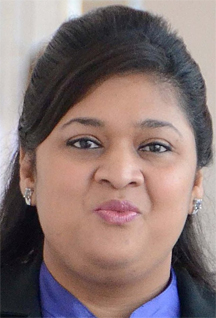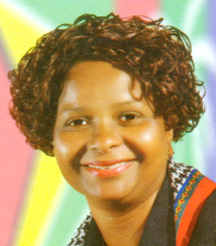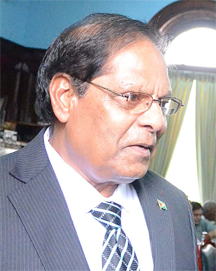A parliamentary committee will be set up to hold national consultations on proposals by the United Nations Human Rights Council for the country to abolish the death penalty, corporal punishment and decriminalise consensual same sex relations and discrimination against Lesbians, Gays, Bi-Sexual and Trans-gender (LGBT) persons.
A motion, which was moved by Prime Minister Samuel Hinds to follow-up on commitments made by the PPP/C administration to the United Nations Human Rights Council since 2010, was carried last Thursday in the National Assembly to submit the issues to a Special Select Committee.
According to the motion, the committee will seek to determine the attitude of Guyanese to corporal punishment and its possible abolition; capital punishment and its possible abolition; and changes in legislative provisions and criminal code regarding consensual adult same sex relationships and discrimination, perceived or real, against LGBT persons.

The motion noted that government is of the view that parliamentary consideration of these the issues would enhance the national examination “procedurally” by being the subject of a committee, which would organise the national consultations in a credible way.
During the debate on the motion, Priya Manickchand, who held the Human Services ministerial portfolio at the time Guyana committed to holding consultations, said that there was evidence which depicts how strongly persons expressed their views on the three issues. She added that the sensitivity of the issues has been recognised. “I would caution that we don’t determine people who don’t hold our views, whatever that view is, as backwards or regressive,” she said, adding that the ordinary citizen should add their views to the issues, irrespective of how parliamentarians view the issues.
“We are duty bound not only to listen to those views and heed those views and it may well be that by listening to the views that we may have to do a lot of work amongst our people from the bottom up,” she added.
Manickchand, who now holds the Education portfolio, has been engaged in national consultations over past several months on corporal punishment and said it has heard various views from teachers, parents and community members.
She added that the committee must ensure that the atmosphere allows everyone to enter and give their views, without fearing that their view is wrong.

APNU MP Volda Lawrence, meanwhile, called for a referendum as regards the section of the motion on LGBT rights. She said that the issue speaks to the removal of values and structures established since creation, and for the Guyanese people not only for them to change their attitudes but also for them to sanction the repealing of laws in the Summary Jurisdiction Act as well as the Criminal Law Offences Act.
She said that the changes to the law require widespread consultations and the government placing the motion at the feet of Parliament does not remove its obligations in this regard.
“This motion gives parliamentarians a basket to fetch water,” she stated, while adding that no mention was made of provisions for the committee with skilled personnel to carry out its work. “What has happened to Guyana, the sovereign state, and why do we have to repeal our laws because a few European delegations propose that we do that?” she questioned.
She said LGBT rights are too contentious a matter and not to be made by a legislative body and that the voters should be given an opportunity to have their say on the issue.
Meanwhile, AFC MP Moses Nagamootoo noted that Guyana is a death penalty state, in which people have called for the “rope to swing” when bandits were on a rampage at various periods in recent history. During the Desmond Hoyte administration, he pointed out, there were a few persons who faced the gallows after being convicted of murder and he noted that there was a lull in crime during this time. However, he said that “we have, because of treaty obligations, taken different stances; the European Union, Human Rights Commissions have also come out strongly against death penalty convictions and assistance is tied to what policy you have and these donor countries would like the receiving country to adopt civil laws before they benefit from taxpayers’ money.”

On LGBT rights, Nagamootoo alluded to what came out of the constitutional reform process, in which he noted there was a strong view that there should be non-discrimination on persons based on their sexual orientation. He said that as a Christian, by choice, it does not give him the right to pass judgment on every human being. “That does not give me a special privilege to say that because I am different from someone else that I should pronounce on someone else’s nature, their character or a person’s orientation,” he stated.





